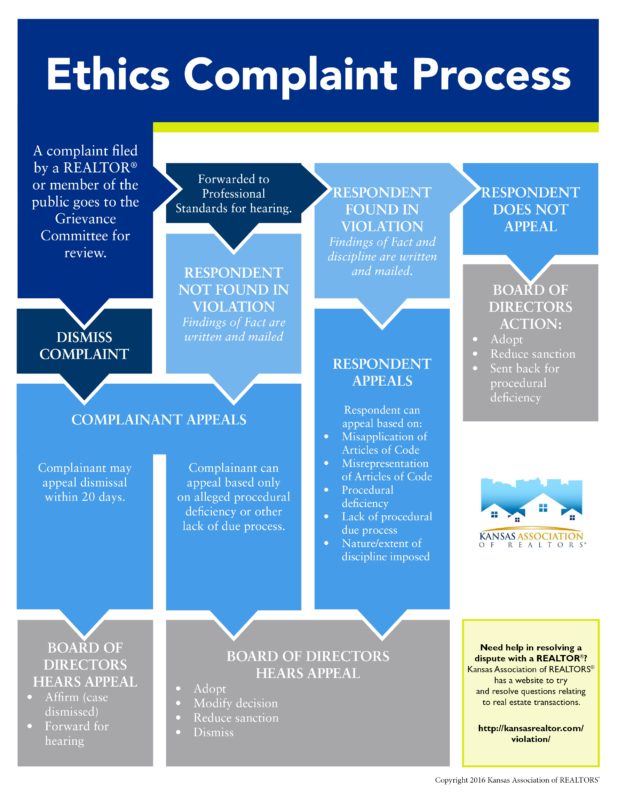REALTORS® are different from non-member licensees in that they voluntarily subscribe to a strict Code of Ethics. If you believe that a REALTOR® has violated one or more Articles of the Code of Ethics, you can file an ethics complaint alleging a violation(s) through the local association of REALTORS® where the REALTOR® holds membership, or participates in a REALTOR® association-owned/operated MLS. You may search for a member’s local affiliation here.
In addition, REALTORS® agree as a condition of membership to arbitrate contractual disputes and specific non-contractual disputes as provided for in Article 17 of the NAR Code of Ethics.
Below are several resources to help you understand what filing and processing an ethics complaint and arbitration request entails, and the general process you can expect when filing an ethics complaint or arbitration request with a local association of REALTORS®. Check with the local association of REALTORS® to ensure you have the proper forms required by that association.
Ethics
- Code of Ethics
View the current NAR Code of Ethics here. - Code of Ethics Training
Required before December 31, 2021. - Before You File an Ethics Complaint
This brochure explains alternatives to consider before filing an ethics complaint, as well as what to expect after filing a complaint. - Initiating an Ethics Hearing
Procedures for processing complaints alleging violations of an Association’s bylaws. - Key Ethics Forms
View or download forms for initiating an ethics complaint. - Sanctioning Guidelines
While NAR does not recommend specific discipline for certain offenses, it does outline key points to be considered with respect to discipline.
Arbitration
- Duty to Arbitrate
From Part Ten, Section 43 of The Code of Ethics & Arbitration Manual. - Arbitratable Issues
From Appendix I to Part Ten of The Code of Ethics & Arbitration Manual. - Key Arbitration Forms
View or download forms for filing an arbitration request - Factors Considered in Arbitration
From Appendix II to Part Ten of The Code of Ethics & Arbitration Manual. - No Findings of Fact in Arbitration Awards
From Appendix IV to Part Ten of The Code of Ethics & Arbitration Manual. - Mediation as a Service of Member Boards
From Appendix VI to Part Ten of The Code of Ethics & Arbitration Manual. For more information go to the Mediation page.
Statements of Professional Standards Policy
View the complete listing of Professional Standards Policy Statements.
Resources for Professional Standards Administrators
- Sample Chronology of an Ethics Complaint
A guide to the ethics complaint process. - Hearing Officers: Arbitration
Four options that may be adopted locally to supplement the arbitration hearing procedures established in the Code of Ethics and Arbitration Manual. - Hearing Officers: Ethics
Four options that may be adopted locally to supplement the ethics hearing procedures established in the Code of Ethics and Arbitration Manual. - Procuring Cause Arbitration Worksheet
This worksheet is for use at local association hearing panels when identifying relevant issues and facts in determining questions of entitlement to disputed funds. - The Five E’s of Due Process
The right of a private organization to discipline members and to conduct dispute resolution is conditioned by law on ensuring due process to all parties as recognized by the five elements explained in this article.
Related Content
- Buyer/Seller Dispute Resolution System (DRS)
This program is designed to resolve disputes between buyers, sellers, and real estate brokers/salespeople not otherwise covered under Article 17 of NAR’s Code of Ethics and Standards of Practice. DRS reflects an effort to design workable and fair alternatives to civil litigation. - Hearing Panelists’ Roles, Preparation, and Etiquette
Outlines what is expected of hearing panelists in ethics and arbitration hearings. - Ethics Hearing Videos
Six-part video series which recreates the process of an Ethics Hearing.





